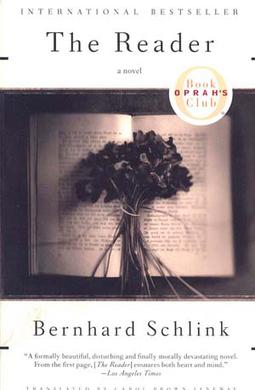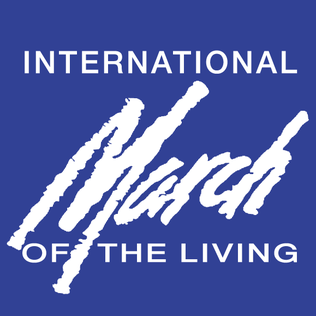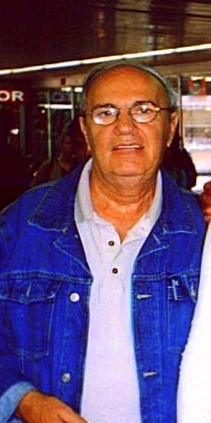
The Reader is a novel by German law professor and judge Bernhard Schlink, published in 1995. The story is a parable dealing with the difficulties post-war German generations have had comprehending the Holocaust; Ruth Franklin writes that it was aimed specifically at the generation Bertolt Brecht called the Nachgeborenen. Like other novels in the genre of Vergangenheitsbewältigung, The Reader explores how the post-war generations should approach the generation that took part in, or witnessed, the atrocities. These are the questions at the heart of Holocaust literature in the late 20th and early 21st century, as the victims and witnesses died and living memory was fading.
The Holocaust has been a prominent subject of art and literature throughout the second half of the twentieth century. There is a wide range of ways–including dance, film, literature, music, and television–in which the Holocaust has been represented in the arts and popular culture.

The March of the Living is an annual educational program which brings students from around the world to Poland, where they explore the remnants of the Holocaust. On Holocaust Memorial Day observed in the Jewish calendar, thousands of participants march silently from Auschwitz to Birkenau.
Kitty Hart-Moxon, OBE is a Polish-British Holocaust survivor. She was sent to the Auschwitz-Birkenau death camp in 1943 at age 16, where she survived for two years, and was also imprisoned at other camps. Shortly after her liberation, she moved to England with her mother, where she married and dedicated her life to raising awareness of the Holocaust. She has written two autobiographies entitled I am Alive (1961) and Return to Auschwitz (1981).

Gerda Weissmann Klein was a Polish-born American writer and human rights activist. Her autobiographical account of the Holocaust, All But My Life (1957), was adapted for the 1995 short film, One Survivor Remembers, which received an Academy Award and an Emmy Award, and was selected for the National Film Registry. She married Kurt Klein (1920–2002) in 1946.

Anne Frank and Me is a 2001 novel by husband and wife writing team Cherie Bennett and Jeff Gottesfeld. Inspired by the life of Anne Frank, it follows a teenage girl named Nicole Burns who travels back in time to 1942 and inhabits the body of a Jewish Holocaust victim. The novel was adapted from a play written and directed by Bennett in 1996.
Ruth Minsky Senderowicz was a Polish-American Holocaust survivor. She wrote three memoirs about her experience: The Cage, To Life and Holocaust Lady.

Eva Mozes Kor was a Romanian-born American survivor of the Holocaust. Along with her twin sister Miriam, Kor was subjected to human experimentation under the direction of SS Doctor Josef Mengele at the Auschwitz concentration camp in German-occupied Poland during World War II. Her parents and two older sisters were killed in the gas chambers at Birkenau; only she and Miriam survived.

Marion's Triumph is a 2003 documentary film that tells the story of Marion Blumenthal Lazan, a child Holocaust survivor, who recounts her painful childhood memories in order to preserve history. The film combines rare historic footage, animated flashbacks, and family photographs to illustrate the horrors she experienced. It is narrated by Debra Messing.

Herman A. Rosenblat was a Polish-born American author, known for writing a fictitious Holocaust memoir titled Angel at the Fence, purporting to tell the true story of a girl who passed him food through the barbed-wire fence at the Schlieben sub-camp of the Buchenwald concentration camp in World War II. The book was planned to be published in 2009 by Berkley Books, but was cancelled after it turned out that many elements of his memoir were fabricated and some were contrary to verifiable historical facts. Rosenblat later admitted to lying on purpose with the intention of "bringing joy".
Tauba Biterman was a Holocaust survivor from Zamość, Poland. She dedicated her life to teaching and sharing memories of the Holocaust. Her speeches painted a realistic portrait of what a Jewish girl from Poland went through between 1939 and 1945.

Alice Herz-Sommer, also known as Alice Herz, was a Czech-born Israeli classical pianist, music teacher, and supercentenarian who survived Theresienstadt concentration camp. She lived for 40 years in Israel, before emigrating to London in 1986, where she resided until her death, and at the age of 110 was the world's oldest known Holocaust survivor until Yisrael Kristal was recognized as such.

Amon Leopold Göth was an Austrian SS functionary and war criminal. He served as the commandant of the Kraków-Płaszów concentration camp in Płaszów in German-occupied Poland for most of the camp's existence during World War II.

Farewell Herr Schwarz is a 2014 German–Israeli documentary film by Yael Reuveny, in her directorial debut. In it she attempts to answer for herself and her family why her great-uncle, a Holocaust survivor, chose to resettle in East Germany afterwards and start a family there, a life her family in Israel only learned about after his death in the late 1980s. In the process of talking to his family, her family, and visiting the home in Vilnius where her great-uncle and grandmother lived with their family before the war, Reuveny considers issues of forgiveness, reconciliation and the effect of the Holocaust on the third generation of survivors, from her own perspective as an Israeli expatriate in Germany.

The March of the Living Digital Archive Project, begun in 2013, aims to gather Holocaust testimony from Canadian survivors who have participated in the March of the Living. Since 1988, Holocaust survivors have traveled to Poland with young students on the March of the Living to share their Holocaust stories in the locations they transpired.
The Apology is a 2016 documentary film by Tiffany Hsiung about three former “comfort women” who were among the 200,000 girls and young women kidnapped and forced into military sexual slavery by the Imperial Japanese Army during World War II. The film is produced by Anita Lee for the National Film Board of Canada.
Eva Galler was a Jewish Holocaust survivor, born in Oleszyce, Poland. While being deported to the Belzec Extermination Camp, she escaped by jumping out the train window with her brother and sister. Her siblings were shot and killed as they fell out the train, but Galler managed to escape by landing in a deep hole.

Margit Buchhalter Feldman was a Hungarian-American public speaker, educator, activist, and Holocaust survivor. Feldman and her family were placed in a concentration camp in 1944, where her parents were killed immediately. The 15-year-old survived by saying she was older, old enough to be sent to a work camp. She was freed from Bergen-Belsen concentration camp on April 15, 1945. After moving to the United States, she raised a family and became a public speaker, sharing her experience with students until her death.

Edward Mosberg was a Polish-born American Holocaust survivor, educator, and philanthropist. During the Holocaust, he was held by the Nazis from 14 years of age in Kraków Ghetto, Kraków-Płaszów concentration camp, Auschwitz concentration camp, Mauthausen concentration camp, and a slave labor camp in Linz, Austria, that was liberated by the US Army in 1945. Nearly all of his family were murdered in the Holocaust.

Zigi Shipper BEM was a Polish survivor of the Holocaust and public speaker. Born and raised in Łódź, Poland, he and his family were persecuted by the Nazis and, like the other Jews in the city, were forced to live in the Łódź ghetto.














